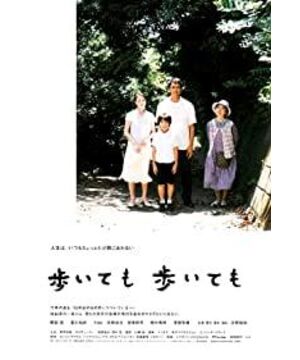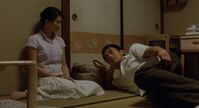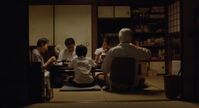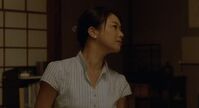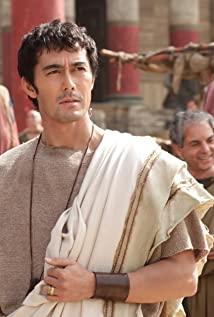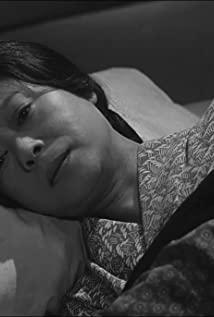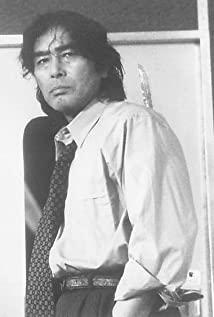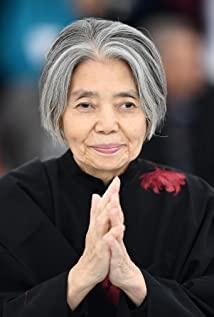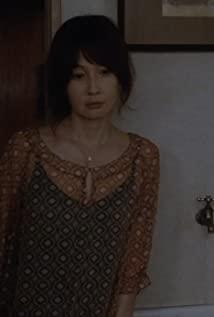There is a family surnamed Hengshan in a small town in Linhai: Junping, the eldest son who inherited the family business, died prematurely because of saving a drowning child. The family usually lives in a lonely, stubborn, silent and serious retired doctor father. He can only smell what he likes. The taste of the food will rush to open the door and come out. The untimely pain of the eldest son's early death and the unhappy old mother Yukali, who is married to a widow and has a second son, takes care of the housework day after day.
The story begins on such a morning: Randa and Chinami each bring their families back to their parents' house in this ancient town on the anniversary of Chunping's death.
Even though her elder sister, Chinami, was quite critical of Junpei, who was still fond of her parents for many years, she still docilely and happily accompanied her old mother to slowly cook the dishes that everyone in the family was used to eating since childhood. Peel radishes, stew meat, pick green beans, and peel corn kernels. And many who did not follow his father's advice became painting restorers, and now they are unemployed and help each other with Yukari's mother and son. For this reason, on the way home, I will also tell my wife to help my parents who are getting older, and don’t let them know of their desperation. I will still quietly put pocket money in my mother’s hands, and see my father’s When he was back, he seemed to appreciate the tenderness hidden in his heart. And the old mother was finally willing to give the most precious kimono to her daughter-in-law Yukali, who didn't like it at the beginning. She also showed the warmest and most tolerant feelings in human nature.
This is an ordinary Japanese family. The wood floor is light and can be seen, the vegetation in the small yard is prosperous, the light in the lattice door is soft and bright, the entrance outside the door allows you to sit and watch the passage of time slowly, and the sundries are old and clean. Placed in their respective places, no matter how they look, they all have the history and growth traces of daily life and diet.
If you get rid of that sad background, how much like every ordinary family of ours.
On holidays or special anniversaries, scattered around us, we return to the homes of our aging parents. Together with my mother, we eat the food that everyone in the family likes, and talk trivially about everyone's preferences and past events, with some quiet joy and almost imperceptible sighs, as if talking about yesterday's unintentional departure. A new sweet cake from the corner bakery is as commonplace as I pass a street.
In those days when I was with my parents and my family from childhood to adulthood, I said that it was not long or short. After walking a long distance, I looked back and looked at it, like a photo set in a wooden photo frame, with A little light brown, and gently stroking the face above with your hand will bring a warm smile.
During the period, of course, there will be fierce quarrels with the once hot and authoritative father at some selected intersections, and the docile and hard-working mother secretly weeps and expresses comfort with a hug, and then only when I fly high alone, or secretly cry when I fall. The scene of being loved at my parents' house, and then every time I go home, I find that my parents' white hair has increased and wrinkles are more obvious, but I have to turn around and leave, knowing that their eyes are behind me and I don't dare to look back. And those previous contradictions and misunderstandings that were not understood are so stubbornly and proudly shelved in the distant years, while the warm part is slowly fermenting, leaving only the mellow fragrance.
Yukali's child stood alone in the yard in the middle of the night and whispered his heart's desire: when he grows up, he will be a piano tuner like his father. If not, he will be a doctor. Under the dark sky, the small figure of the child made me feel wet.
They had a walk. Old father, many, and stepson. We walked along a shady mountain road with stone steps, and slowly walked to the seaside not far down the mountain. The mountain road is a little steep, and the old father with a cane needs to wipe off his sweat occasionally, but he doesn't stop.
However, it takes three meals less than two days to tell the daily life of an ordinary Japanese family. The camera is quiet and often paused. Even the piano soundtrack behind it is soothing and quiet, but those trivial details are clearly visible. Makes me feel a kind of solemnity, the solemnity of ordinary daily life. Even in the death and parting of many parents in the end, there is no grief to see.
In the last episode of the Japanese drama "Late Night Cafeteria", the cafeteria owner said to the lost guests: The world is like a lost river, don't underestimate life. And 楾 means to come back in Japanese. In this swirling river of life, I also hope to be able to say with a smile before the guest turned around and left: any scars will be slowly healed. Did the old father's scars in "Walking Nonstop" be healed by the sea when he stood on the beach with a lot of people?
While watching, I thought of Yasujiro Ozu more than once. I also like to use such a seemingly static long shot to represent the daily life of a Japanese family, as if nothing was said, but it was clearly said behind the scenes. Is it hot? No, at least we can't see it in the camera, but in those few words, it seems to see the joys and sorrows of a family. Is it appropriate if I say that the director is a tribute to Ozu by Hirokazu Koreeda?
View more about Still Walking reviews


